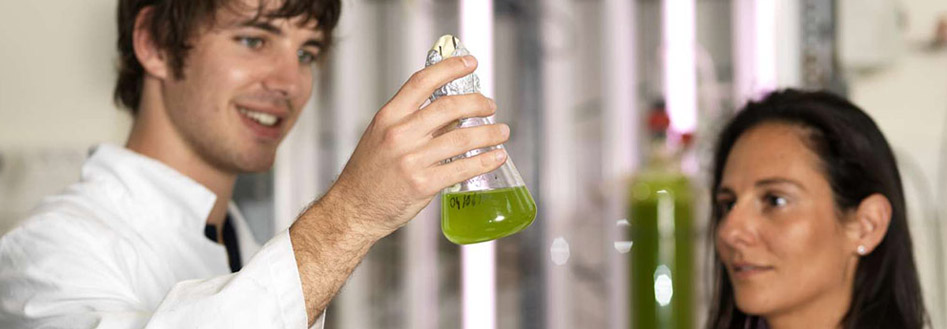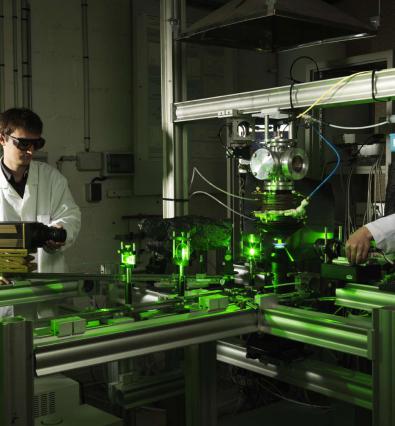
The LGPM laboratory is involved in two inextricably linked fields of investigation: Process Engineering and Materials. Modeling, simulation and experimentation are the key words in common between these different research subjects.
This complementarity allows an understanding of microscopic phenomena to be used in the simulation, optimization, and intensification of transformation and development processes. Our expertise is, in particular, applied to sustainable aspects of processes (e.g., material and energy savings) and bio-processes (use of renewable resources).
These fields have been strengthened with the introduction of a “white biotechnologies” center in 2010, which allows the laboratory to be present in the promising field of bio-economy.
The laboratory is organized into three research teams:
Materials and Biomaterials
- Metals, wood and natural fibers
- Production and transformation processes
- Tribocorrosion
Chemistry and Separation Processes
- Liquid-liquid extraction, emulsion extraction
- Transportation and deposition of particles, filtration
- Analytical and preparative chromatography
Bio-processes
- Understanding physicochemical and biological phenomena
- Multi-scale modeling, implementation and monitoring of bioreactor control
- Microalgae (CO2 capture, purification of wastewater), anaerobic digestion
- Production and purification of molecules of interest
Fields of Application
Biomass, clean biotechnologies, material characterization and development, energy, environment, chemical and pharmaceutical industries, photovoltaics, water treatment, and hydrometallurgy
Specific Equipment
- Analysis and characterization: spectrometers (elemental analysis, ICP-AES, UV, IR, atomic absorption, X fluorescence), chromatography, SEM + EDS, environmental SEM, interferometric microscopes, microtopography, tribocorrosimeters, DSC-linked thermobalance, biological activity by calorimetry, DMA, mass diffusion, permeability, sorption isotherms, laser granulometry, drop tensiometry, particle image velocimetry (PIV), deformation by image correlation
- Processes: liquid-liquid extraction, preparative chromatography (gas and liquid phases), ultra and nano filtration, reverse osmosis, photobioreactors, drying, heat treatment, high temperature wetting, surface treatments
- Modeling/simulation: direct numerical simulation of depth filtration, multi-scale simulation of coupled transfers in porous media, multiphysics simulation, mesh-free numerical methods, bio-process modeling
VIDEOS
Industrial Partners
- ArcelorMittal,
- ARD,
- CEA,
- CNES,
- Cristal Union,
- EMULSAR,
- Ennesys,
- ERAMET,
- Eurodia,
- Futurol,
- IFP Energies nouvelles,
- Oeno Concept,
- Olygose,
- Rio Tinto Alcan,
- Saint-Gobain,
- Soliance,
- Vale (Brazil)
Academic Partners
- Several French universities, CNRS, CEA, INRA (French National Institute of Agricultural Research) laboratories
- School of Mathematical Sciences QUT (Australia),
- Universidade de São Paulo,
- Université du Québec en Abitibi-Témiscamingue (Canada),
- Cornell University (USA),
- Poznan University of Life Sciences (Poland),
- Universitatea Dunarea de Jos (Romania),
- State Teaching University of Perm (Russia),
- École Nationale d'Ingénieurs de Monastir (Tunisia)
Key Figures
- Instructor-researchers: 15
- Technical and administrative staff: 18
- PhD Students: 22
- Tier A publications (Source: Web of Science): 21
- Value of signed contracts: €2.2M, including CEBB (Biotechnologies and Bioeconomy Excellence Center)
Contact
Website: www.lgpm.ecp.fr
Director: Patrick Perré
Tel.: +33 (0)1 41 13 16 79
E-mail: patrick.perre@centralesupelec.fr
Secretariat: Catherine Kruch
Tel.: +33 (0)1 41 13 11 26




